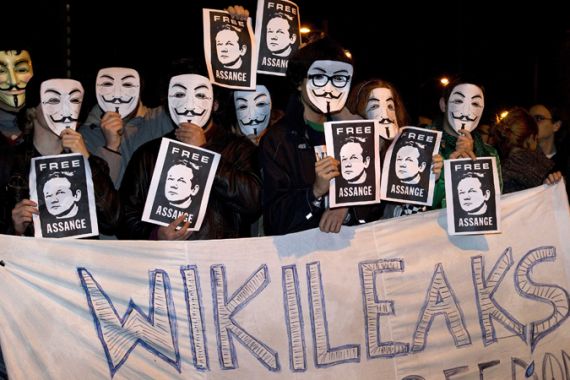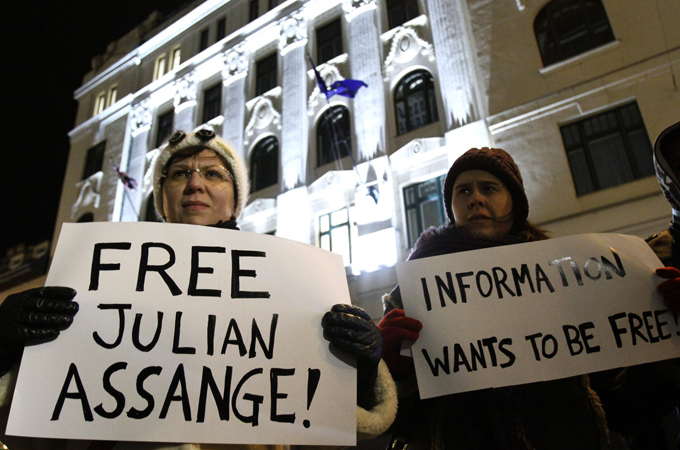WikiLeaks and the public interest?
Civil society groups and analysts discuss the benefits of releasing classified information to the public.

 |
| One former FBI agent said the 9/11 attacks might have been prevented if WikiLeaks had released information about lapses in US security operations and intelligence gathering [Reuters] |
Reactions to the recent releases by WikiLeaks have ranged far and wide across the spectrum and been voiced with much fervour. Meanwhile, the over-attention to some of the less important details revealed and the intrigues surrounding Julian Assange, the founder of the whistle-blowing site, has been criticised by media watchdog groups.
But the question that has been overlooked in all of this is: just how valuable is the information revealed for leading members of civil society – public interest lawyers, human rights investigators, foreign policy analysts and critics? And has WikiLeaks helped or hindered their cause?
Al Jazeera put these questions to members of civil society in the US and beyond.
Legal experts and litigators have described the information revealed by WikiLeaks as “extraordinarily useful” in terms of providing evidence for legal pursuits and government accountability. Human rights analysts, meanwhile, explained that the Iraq and Afghanistan document dumps “present an unvarnished and often compelling account of the reality of modern war” – noting how a number of previously unknown details helped to further their work by “putting more meat on the bare bone”. And, for their part, foreign policy analysts and critics have praised the releases for exposing the foreign policy failings of the Obama administration.
Civil rights lawyer: the unravelling of US hegemony
“This is dynamite,” said Michael Ratner, a veteran civil rights lawyer and the president of the Center for Constitutional Rights (CCR), excitedly when asked for his thoughts on WikiLeaks. “I have not seen anything like this for decades, since the Vietnam War era.”
The reason for Ratner’s enthusiasm is clear: the revelations published by WikiLeaks have resulted in immediate consequences for several important international cases related to government accountability and human rights abuses.
Ratner spoke about one case, in which the CCR, in conjunction with the European Center for Constitutional Rights, submitted an expert opinion on Monday. The legal filing urges a Spanish judge to retain jurisdiction over an investigation into the role of former Bush administration officials in authorising the torture of detainees held in US custody.
The evidence includes diplomatic cables released by WikiLeaks which revealed that US embassy and Obama administration officials had pressured Spanish officials to thwart the investigation. Included in the memos are efforts to prevent a Spanish judge well known for his rulings against other human rights abusers from trying the case.
Ratner said: “The US is claiming judiciary independence, but the cables reveal that the statements for judicial independence were completely hypocritical, as they actively tried to externally influence the process through political means.”
Another Spanish case, in which the cables are being used as evidence, involves the death of a Spanish cameraman. José Couso, a cameraman with the Spanish television network, Telecinco, who was working with Taras Protsyuk, a Ukrainian cameraman working as a stringer for Reuters. Both died on April 8, 2003, following an M1 Abraham tank strike on the 15th floor of the Palestine Hotel in Baghdad. The hotel, which was a Pentagon-approved haven, was the base for a plethora of foreign journalists. Several other media locations were also victimised that day, killing Al Jazeera correspondent Tareq Ayyoub and injuring four others.
The US embassy cable, as reported by the Madrid-based daily, El Pais, reads: “While we are careful to show our respect for the tragic death of Couso and for the independence of the Spanish judicial system, behind the scenes we have fought tooth and nail to make the charges disappear.”
Last July, Spain’s supreme court ordered the extradition and arrest of three US soldiers over the cameraman’s death. But the Couso family last week announced their plans to lodge a legal filing demanding a probe into whether US pressure was responsible for the shelving of the case on two earlier occassions.
“It is overwhelming the amount of usefulness that these cables pose for us,” Ratner said. “We are seeing the unravelling of secret wars and secret ways to influence courts and others in impunity in every form we can get them into. We are witnessing before our eyes the unravelling of American hegemony. I’m very eager to learn more through the ongoing cable revelations about all the secret torture sites located throughout the world.”
Whistle-blower: what if WikiLeaks existed pre-9/11?
While Ratner is contemplating the possible impact of future leaks, some whistle-blowers are looking to the past and wondering what would have happened if WikiLeaks had existed before the 9/11 attacks.
In an LA Times editorial, several prominent whistle-blowers suggested the 9/11 attacks “could have been prevented” had WikiLeaks existed as a remedy against US intelligence failures at the time.
One of those writers was Coleen Rowley, who served as a legal counsel and Federal Bureau of Investigation [FBI] special agent for more than two decades. She leaked information – her own memo to the director of the FBI about intelligence failures related to the Iraq war – to the New York Times in 2003.
“My pension was lowered and I was a pariah for a long time,” she reflected. “But I am glad I did it, because the conscience I have now allows me to live with myself.”
“The failure to share information was a key problem in the lead-up to 9/11,” Rowley reasoned. “If WikiLeaks had existed in the build-up to 9/11, I personally would have considered leaking documents; even just the fact that Zacarias Moussaoui [one of the 9/11 hijackers] was arrested, in light of FBI denials to follow-up on the arrest before 9/11 occurred. If that mere bit of information was public, it likely would have deterred the hijackers from going forward with their plan.”
When asked about her own motivations, as well as those of other whistle-blowers and WikiLeaks itself, Rowley said: “I do think that when you are in a situation that constitutes fraud, waste, abuse, illegality and serious risk to public safety, you have to do something. I don’t know how people can argue with that.”
General public: person of the year?
Rowley’s view on those who take issue with her acts, and those of WikiLeaks, contrasts sharply with the ongoing attempt to prosecute Assange under the auspices of the Espionage Act.
Dinah PoKempner of Human Rights Watch told the Inter Press Service that possible charges and “threats made against Mr. Assange’s life are particularly reprehensible …. Traditional media frequently reveal non-public government information of an embarrassing nature, and this can be in the public interest and in furtherance of the right to receive information in a democratic society”.
Foreign policy analyst and critic Bob Naiman, of Just Foreign Policy, told Al Jazeera that the US approach to WikiLeaks is “an outlier amongst governments”. Criticism emanating from European officials about such an approach has been strongly worded and voiced on a number of occasions. While, Luiz Inácio Lula da Silva, the Brazilian president, described the arrest of Assange as “an attack on freedom of expression”.
But Ratner is unsurprised by the US reaction: “This is the biggest bully on the block and the bully doesn’t like it when its utter hypocrisy is exposed to the world and that is exactly what is happening.”
Given the usefulness of the WikiLeaks releases to a significant spectrum of civil society and those working in the public interest, it might be natural to assume that public support for WikiLeaks would be high. And, Assange has been overwhelmingly chosen as Time magazine’s “Person of the Year” through an online poll that garnered tens of thousands of responses on its website.
However, polling data also points to mixed feelings among citizens of the US, Canada and the UK. In recent polls conducted by CBS, CNN, Angus-Reid and Zogby in these countries, significant numbers answered that they were “unsure” when asked about their views on WikiLeaks. Further questioning revealed a sharp divide between those who favoured the release of the documents and those who did not.
Mass media failings
Sam Husseini, from the Institute of Public Accuracy, explained to Al Jazeera how poor media coverage translates into misinformation being passed on to the public: “There has been so much misinformation on WikiLeaks and it has had a negative effect on public opinion. WikiLeaks is taking all the heat, but the newspapers are the ones who are determining the direction. There is this strange dichotomy where the New York Times gets the leaks and turn-around to ask the administration what they think is important, and then get told the administration’s priorities which they duly report and focus on.”
The media watchdog group, Fairness and Accuracy in Reporting (FAIR), has criticised a number of influential mainstream news media outlets based in the US for their coverage of WikiLeaks. When WikiLeaks released a harrowing video of US soldiers indiscriminately killing civilians and journalists from a helicopter in Iraq, FAIR identified the scant amount of coverage across the spectrum of the mainstream media.
FAIR also criticised The Washington Post and the New York Times for downplaying the significance of the Afghan diaries by saying that, on the whole, they did not reveal anything of importance that the government had not already admitted to. The human rights community, however, has disagreed with this suggestion.
While much attention has been given to embarrassing diplomatic secrets revealed in the release of the cables, there has been virtually no US news media attention on what Naiman brought to light when interviewed by staffers at FAIR on their radio show.
The cables released by WikiLeaks contain proof that the embassy in Honduras characterised the overthrow of former President Manuel Zelaya as being nothing less than an illegal and unconstitutional action. This was in direct contradiction, however, to official positioning on the issue. If the embassy characterisation was revealed, much less taken on as official policy, crucial diplomatic, military and financial support to the coup regime would have been forbidden by US law.
The barometer of the effectiveness of WikiLeaks, as well as its image to the public, may be significantly impacted by the tone and tenor of ongoing media coverage.
Regardless of how coverage may turn out, however, lawyers, human rights investigators and foreign policy critics will undoubtedly continue to turn to the many revelations brought to light by WikiLeaks.
As Phyllis Bennis, a foreign policy analyst with the Institute of Policy Studies, put it: “WikiLeaks isn’t the Pentagon Papers, it is the raw materials the Pentagon used to write the Pentagon Papers. The challenge for civil society is to use this raw material to write our own Pentagon Papers.”
If present indications are a reliable measure, when it comes to the information revealed by anonymous sources and released by WikiLeaks, many leaders of civil society and public interest workers will be doing just that – and far more – well into the foreseeable future.